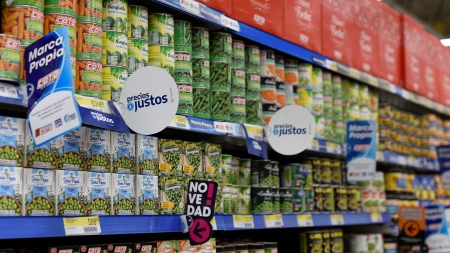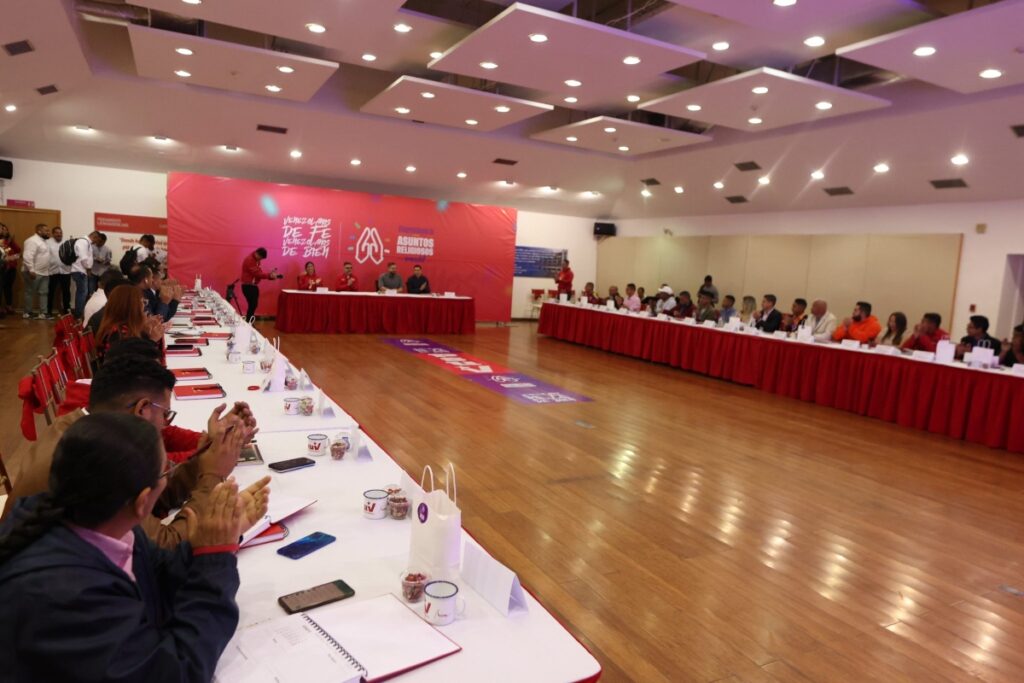The Minister of Economy, Sergio Massa, launched this Friday the extension of the Fair Prices Program that will run until next June and reduces the monthly average of the adjustments of 86% of the products that are part of it from 4 to 3.2%. of the offer to which consumers will be able to access.
“What this program intends is, by containing 86% of the products that Argentines consume, to give them two certainties: the first is that there are almost 50,000 products and the second that from February 1 to June 30 they will increase only 3 ,2% per month”said Minister Massa at the ceremony that took place at the Kirchner Cultural Center (CCK).
Massa led the relaunch accompanied by the Secretary of Commerce, Matías Tombolini; the Secretary of Industry, José Ignacio de Mendiguren; the head of the General Confederation of Labor (CGT), Héctor Daer, and the president of COPAL and the UIA, Daniel Funes de Rioja, among other officials, businessmen and representatives of the union sector.
“The agreement includes the school basket and the price of private schools”
Massa announced a school basket for the start of classes and a single criterion for the increase in fees for private schools with a path of 3.5% per month until June 30.
Massa said that “some provinces had authorized increases of up to 40% for March”, and that now “a single criterion has been established for the entire country, which will be announced next Wednesday at the Federal Education Council, which drops by 40% on average the initial increase and establishes a path of 3.5% until June 30 in the case of schools”.
The minister highlighted that “as was the case in the first stage, (in the program) there are 2,000 products that will continue to have fixed prices, because it is what allows the consumer to care a little more about their income, their salary, the time to choose in the supermarket gondola”.
In the Government they emphasize that it is a “voluntary agreement” with 482 companiessomething that is favored because businessmen perceive that there are some economic policy arguments that are being “fulfilled”.
For the minister “this second stage has more rewards and more punishments.”
“A large part of the food industry value chain and the personal hygiene and cleaning sectors, in the production complex, will have a credit program to increase the production of capital goods,” he said.
“The second big challenge was solve that fear that some people have the idea that verification or control is bad. They saw a vest from a municipality, a union, in a supermarket and immediately some of them panicked, when in reality what they were doing was verifying“, stressed the head of the Palacio de Hacienda.
In this sense, he added that “for those who do not like physical verifications, we implement a verification system of 15 million data per day online.”
The brand new control system will be carried out through software developed by Arsat and Amazon, which will be managed by the Secretary of Commerce and will allow monitoring in real time if the price commitment assumed by the companies is being met in the large outlets.
In this way, all controls will be in charge of the State.

In these controls, the Government will count that the support of the municipalities that join the agreement: “The vast majority of the mayors who are here stated that they not only want to be controllers, but that they want to sit down with the companies so that they make the effort to lower prices for people and share the effort in some way, to the extent May the effort also reach your neighbors”
This relaunch of the program brings forward to February the central guidelines of the agreement announced in November of last year, which in principle was going to be extended until March, in which an average monthly increase of 4% was stipulated with the participation of 102 companies.
This time the numbers are more ambitious: the average increase drops to 3.2% and the number of companies almost quintuples.
The expansion plans to maintain a basket of 2,000 products with frozen prices, which are estimated to rise by around 9% compared to January, and which will rotate according to the production of each company.

For Tombolini, the expansion of Fair Prices is possible due to fiscal order and more reserves
The Secretary of Commerce, Matías Tombolini, affirmed that the extension of the Fair Prices program occurs within the framework that the economy is going through, with a greater order in fiscal matters and accumulation of reserves.
“This agreement is only possible because it is constituted in the context of a clear economic policy such as fiscal order and the accumulation of reserves,” Tombolini said this afternoon in an act held at the CCK, which was headed by the head of the Palacio de Hacienda , Sergio Massa.
The official maintained that the guideline of average increases of 3.2% per month is an “objective that seeks to moderate inflation expectations.”
Tombolini also highlighted the incorporation of software developed by Arsat and Amazon that will allow “an absolutely unique monitoring system” to be carried out regarding compliance with the program by participating companies.
He stressed that, in addition, controls will be carried out on the prices published by the large outlets on their respective web pages.
“More than 35 people are going to be looking at the prices published on the websites every day to detect possible deviations and define, once the company’s response has been obtained, possible inspections,” explained the secretary.
For his part, the head of COPAL and the UIA, Daniel Funes de Rioja, stressed the importance of working together so that the industry has “stability and predictability.”
“We are summoned by the will to find ways of solving since inflation is a distorting expectation,” said Funes de Rioja.
In turn, the head of the CGT, Héctor Daer, remarked that this agreement “radically changes the pre-existing theories of sectors that have little to do with social sensitivity.”
“We clearly support a policy for inflation to drop definitively because we represent a sector that is convinced to go against the rise in the cost of living,” concluded Daer.


















